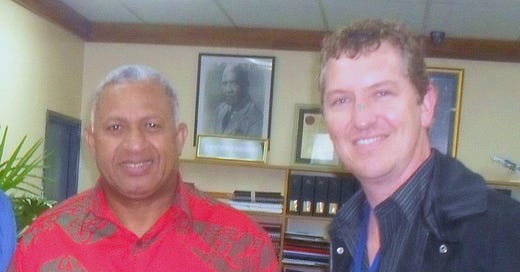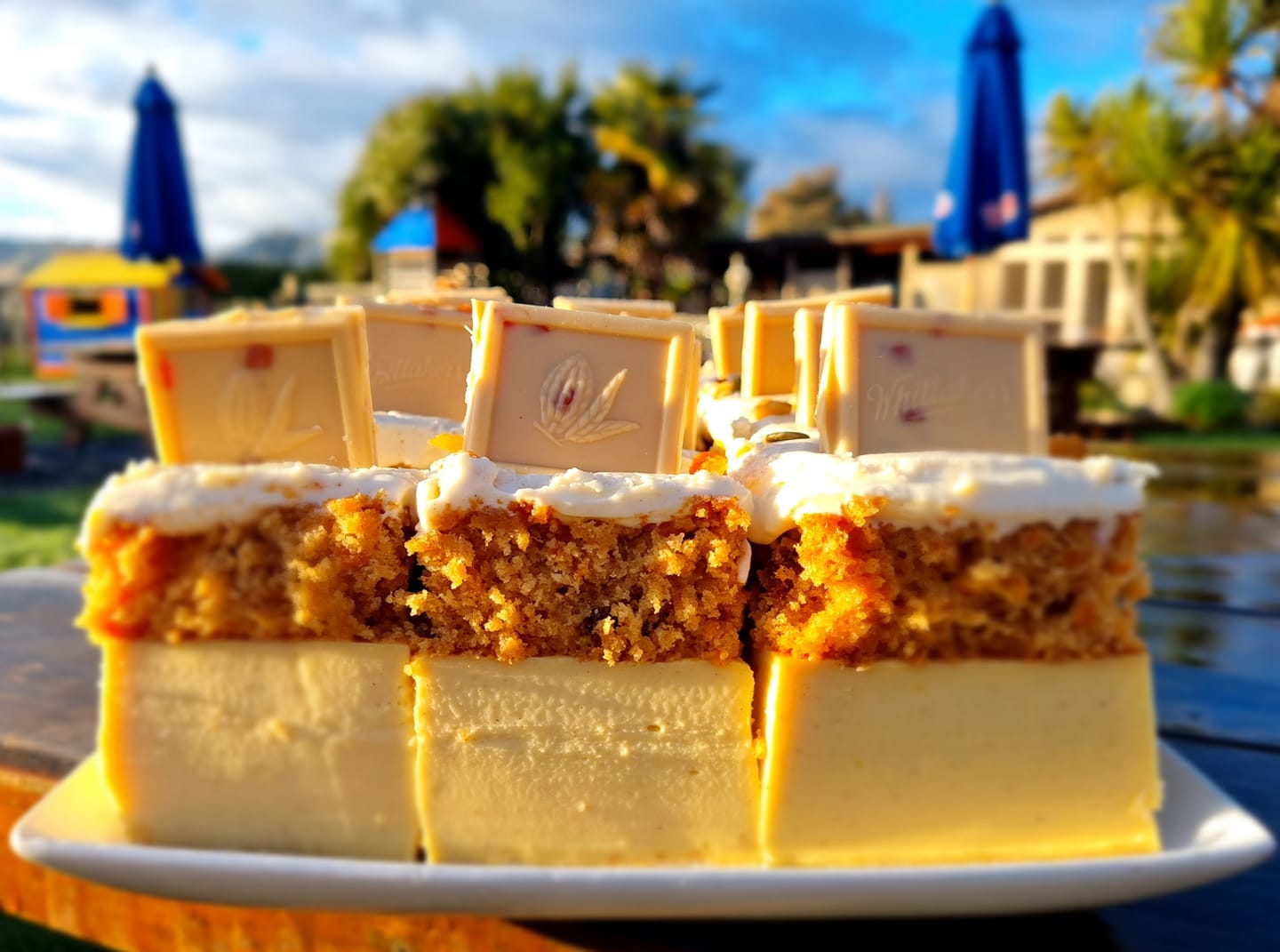The Dictator, the Spy, the Custard Square, and the Cavill Question
Notes on Paranoia, Pastry, and the Theatre of Pacific Power
Out of frugality (or perhaps a writer’s stubborn commitment to the indignities of public life), I would occasionally endure the nine-hour Intercity bus trip from the Rangitikei to Auckland. It is not a journey for either the faint of heart or weak of bladder. The only reprieve on that long haul came at the Flat Hills café near Taihape, where I’d dependably order a passionfruit custard square and a black filtered coffee. I don’t even like passionfruit. But on that square, and with that coffee, all the wretched fruit's sins were forgiven. It was not unlike what I imagine sex with Henry Cavill would be - less like gay sex (which I am not meant to enjoy), more like being bench-pressed by Western civilisation. The term "Cavillsexual" probably belongs on the LGBTQIA+ flag if there were any bandwidth left and a color remaining on the palette to represent us.
The rest of the ride was always reliably hellish. There’s something uniquely democratic about long-haul travel. Every smell, every cough, every flick of an overhead light is communal property. Every unwrapped fish meal packed by a regrettably prepared Asian passenger.
It was on one such trip that I found myself seated beside a middle-aged Fijian woman. I disturbed her bible reading to mention that I had met her country’s then-dictator, Commodore Frank Bainimarama, during a research visit for a portrait I hoped to produce. She smiled warmly. She liked Bainimarama. Many Fijians did. And why not? The self-proclaimed dictator-for-diversity, Frank was a strongman who kept the buses running and recognised the place of the Indo-Fijian in the nation. And yet, try to tell Helen Clark, our Prime Minister at the time, that.
I had been driven across the main island, from Nadi to Suva, in the dead of night - 3 a.m. - to meet him. On arrival, we (my two Indian guides and I) were told a crisis had erupted at the Reserve Bank and that we’d need to wait. From 7 a.m. to 2 p.m., we sat outside his door in a waiting room not dissimilar to that of a dentist circa 1978, as the Commodore roared at his ministers through a wall of reinforced tissue paper. By hour four, my nerves had been boiled to stock. Then, providence: a young soldier handed me a cup of black coffee. I swallowed it in a single heroic gulp and somehow delivered one of the most fluid pitches of my life. Bainimarama thawed noticeably once I presented him with a rugby jersey, gifted by my nephew, a former All Black, then playing in Castres, France. The diplomatic equivalent of a dowry, I was suddenly family. He even invited me to the annual Army vs. Police rugby match in Suva, a sort of Fijian Super Bowl. I declined. Possibly one of the most foolish decisions of my life. I could’ve been a dictator’s date to a bloodsport in the tropics. One doesn’t get offered that twice. Anyhow, I stepped out into the sunshine feeling like a character from a Graham Greene novel, which I took as a measure of my success. Not that the documentary would eventuate, but I’ll save that miserable tale for another day.
The conversation on the bus then turned to Fiji’s Jewish community. Small, obscure, and enduring - around sixty souls - descended from 19th-century merchants and adventurers who’d somehow made it to the South Pacific without dying of malaria or boredom. I asked the woman whether they maintained much visibility. The fact that there was any community at all was news to her.
At that moment, the man in the seat ahead of us began to fidget. He wore long, unwashed hair and had the general complexion of an overworked ashtray. And he wore chefs’ pants, the ones with black and white checks.
“I know who you are,” he said. “Really?” I replied.
“You’re Mossad.”
Now, I had told the Fijian woman that I was a television producer. But to the paranoid mind, nothing is as suspicious as the truth. I was no longer a weary passenger chatting idly about politics; I was a foreign agent.
“Look ahead and don’t say another word to me, mate,” I said. He resumed muttering, almost rhythmically. “Mossad… Mossad…”, as if saying it often enough could render it real. The Fijian woman turned to me and gave a kind, wordless smile. A small gesture of solidarity, of shared embarrassment, perhaps even of apology on behalf of her adopted nation. I appreciated it more than she knew. But the man remained, muttering just out of reach, so close I could smell the oil in his hair. Boy, did I have a son-of-a-bitch of an 8 and ½ hour schlep ahead of me.
But thankfully, he was off the bus within 15 minutes, disembarking in Waiouru, presumably to haunt the kitchen of some provincial café and cough over microwave-warmed lasagne.
That was the first and only time I’ve ever been accused of being a secret agent. It wasn’t the romantic episode I might have imagined it to be. And if it happens again, I sincerely hope it involves a tuxedo, a casino in Montenegro, and an accuser far more attractive.





